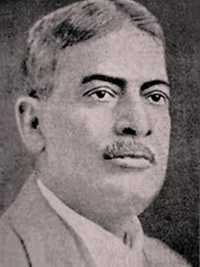Upendranath Brahmachari Scientist
Rai Bahadur Sir Upendranath Brahmachari (Bengali: উপেন্দ্রনাথ ব্রহ্মচারী) (19 December 1873 – 6 February 1946) was an Indian scientist and a leading medical practitioner of his time. He synthesised Urea Stibamine (carbostibamide) in 1922 and determined that it was an effective substitute for the other antimony-containing compounds in the treatment of Kala-azar (Visceral leishmaniasis) which is caused by a protozoon, Leishmania donovani.His discovery led to the saving of millions of lives in India, particularly in the erstwhile province of Assam, where several villages were completely depopulated by the devastating disease. The achievement of Brahmachari was a milestone in successful application of science in medical treatment in the years before arrival of antibiotics, when there were few specific drugs, except quinine for malaria, iron for anaemia, digitalis for heart diseases and arsenic for syphilis. All other ailments were treated symptomatically by palliative methods. Urea Stibamine was thus a significant addition to the arsenal of specific medicines.
Personal facts

| Birth date | December 19, 1873 |
|---|---|
| Birth place | |
| Nationality | |
| Date of death | February 06, 1946 |
| Residence | |
| Education |